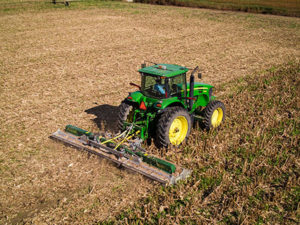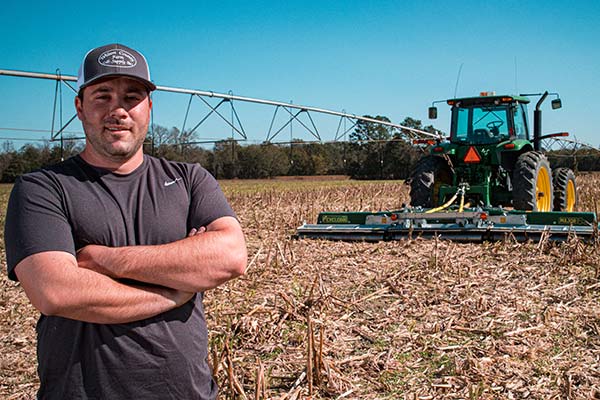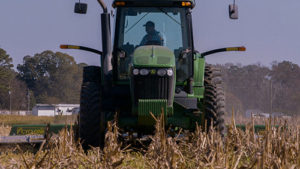New equipment has its place across two operations
New 20-ft Cyclone helps Wilson County, North Carolina farmer Thomas Webb successfully balance labor and equipment demands between mixed crops including corn, tobacco, peppers and cucumbers. “Even at 7 mph, it performed amazingly well no matter on which corn field we were working.”
Armed with a Field Crops Technology degree from NC State University, the fifth generation farmer came home after college, and several months later, had an opportunity to start a vegetable farming venture with his life-long friend, Walker Shelton. “This year, Walker and I grew 160 acres of cucumbers and 15 acres of specialty peppers that are drip irrigated thanks to a great water supply from the Contentnea Creek, a tributary of the Neuse River,” says Thomas, who, along with his father, Ricky, also operate Webb Family Farms, a 2,200-acre tobacco, sweet potato, corn and wheat operation. “After a farmer down the road from us retired, we began working some of his land and his existing vegetable operation. We also picked up 10 of his H-2A workers. Now we have 40 laborers that work for us each season harvesting our tobacco, sweet potatoes, peppers and cucumbers.”
Old school buses modified into specialty farm equipment
Because tobacco, sweet potatoes, peppers and cucumbers must be hand harvested, both operations maintain some specialty equipment. “Several years ago, we heard our county was selling some of their older school buses. We bought a few and got creative,” says Webb, who, along with his father and others, chopped off the back top portion of the buses, took out the seats and dropped a ‘drag belt’ system down the aisleway. We even modified one of the buses and installed spray equipment on it that we use mostly to spray our tobacco.”
When Thomas and his father realized their 15-year old rotary cutter was not mulching the farm’s corn stalks like it once did, they decided a new equipment purchase was imminent. “The old machine just wasn’t cutting the mustard any longer,” Webb says. “It just stopped performing like it should. It would lay the stalks over, but leave streaks of residue in ‘wind rows’ across the field.”
Cyclone covers 8 rows of corn
It was about that time Webb saw a video of a MJ30-630 Cyclone mower manufactured by family-owned Major Equipment Company in Ireland. “We were running eight row 30-inch beds on our corn, and we wanted a cutter/shredder with a 20 foot cutting width that would cover 8 rows at a time,” Webb says. “Travis Lamm, my equipment dealer at Quality Equipment, had gotten in one of the Cyclones, so we went down at looked at it.”
Weight and residue evenly distributed
Nine gear boxes individually driving 36 smaller blades, all rotating at 190 revolutions per-second with an entire frame made with rust-resistant and durable galvanized steel intrigued Webb. “It’s got a three-point hitch hook-up so all of the cutter’s weight is distributed between the tractor and a very innovative full-length rear roller that ensures stability on uneven ground. That rear roller does an amazing job breaking up corn root balls and distributing the residue evenly across the cutting swath.”
Ample rainfall this growing season led to stronger, healthier corn stalks on many of their fields, and they had some of the best corn yields ever on Webb Family Farms. “The corn liked the excessive rainfall, but tobacco does not like wet feet, so our tobacco yields suffered,” Webb says. “I worried that the Cyclone might not be able to handle the thicker corn stalks. Although it’s a nice option to have, I never had to adjust the cutting height. Even at 7 mph, it performed amazingly well no matter on which corn field we were working.”

How well? “A landowner who lives near us stopped by and commented that my shredded corn field was so smooth and level, it looked like a golf course. I just laughed and told him the Cyclone is manufactured in Ireland, but I’m not trying to get into the business of golf. I’ll just stick to farming.”
H-2A, juggling labor
Sharing labor and equipment between the Webb Family Farms row crop operation and the Planters Produce vegetable operation has its challenges, but the economic advantages for the two entities outweigh the challenges. “Cucumbers must be harvested every three days. If they get bigger than the circle you can make with your middle finger and thumb, they’re unmarketable,” Webb says. “If we get into an equipment bind mid-season with tobacco or sweet potatoes, we can shift some of the tractors, trailers and/or workers from our vegetable fields to the fields where we’re harvesting tobacco or sweet potatoes,” Webb says. “It’s beneficial to us both economically and logistically to have that flexibility.”
The H-2A wage rate was just over $10 an hour the first year Webb used the program to secure labor through the North Carolina Growers Association (NCGA) – the nation’s largest user of the agricultural guest worker program. “The Program has been good for us, but the wage rate has risen incrementally each year since we started contracting workers. That’s an expense we somehow absorb into our operational costs,” Webb says. “This year it jumped to $12.67, and there’s also an up-front ‘visa acquisition’ fee of $850 to bring each H-2A worker into the United States.”
The NCGA handles all of the paperwork, compliance and regulatory issues related to the workers. They also collect the fees. “The administration has published a final regulation in the Federal Register to adjust the Adverse Effect Wage Rate in the H-2A program,” says Lee Wicker, deputy director, NCGA. “The regulation, which goes into effect on December 21, if it isn’t blocked by the courts, will freeze the H-2A wage rate at the current level for 2021/22 and will be modified going forward based on the average change in wages across all occupations in the economy. This is a substantial improvement over the current structure, gives growers more certainty of labor costs and workers more job security. This regulatory change is subject to legal and other challenges, some of which will depend on the final outcome of the 2020 elections. This doesn’t ‘solve’ agriculture’s labor crisis, but it should help slow down its demise.”
This is an edited version of the story which originally appeared in The Wilson Times here.
[/vc_column_text][/vc_column][/vc_row]



